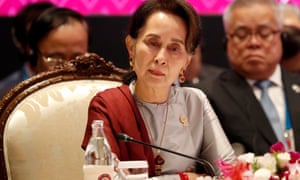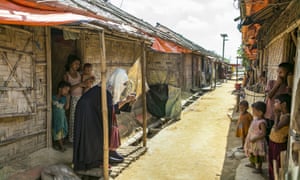Case launches in Argentina under ‘universal jurisdiction’ demanding justice over ‘existential threat’ to minority

Aung San Suu Kyi
is among several top Myanmar officials named in a case filed in
Argentina for crimes against Rohingya Muslims, the first time the Nobel
Laureate has been legally targeted over the crisis.
Rohingya and Latin American human rights groups submitted the lawsuit in Argentina on Wednesday under the principle of “universal jurisdiction,” a legal concept enshrined in many countries’ laws.
The premise is that some acts – including war crimes and crimes against humanity – are so horrific they are not specific to one nation and can be tried anywhere.
Rohingya and Latin American human rights groups submitted the lawsuit in Argentina on Wednesday under the principle of “universal jurisdiction,” a legal concept enshrined in many countries’ laws.
The premise is that some acts – including war crimes and crimes against humanity – are so horrific they are not specific to one nation and can be tried anywhere.
Gambia files Rohingya genocide case against Myanmar at UN court
Application seeks punishment for culprits, compensation for victims and end to attacks

Myanmar is to face accusations of genocide at the UN’s highest court over its treatment of Rohingya Muslims.
A 46-page application has been submitted to the international court of justice by the Gambia, alleging Myanmar has carried out mass murder, rape and destruction of communities in Rakhine state.
If the ICJ takes up the case, it will be
the first time the court in The Hague has investigated genocide claims
on its own without relying on the findings of other tribunals, such as
the international criminal tribunal for the former Yugoslavia, which it consulted for claims against Serbia and Croatia.
Under the rules of the ICJ, the
application argues, member states can bring actions against other member
states over disputes alleging breaches of international law – in this
case the 1948 convention on the prevention and punishment of the crime of genocide.
The Gambia,
a member of the Organisation of Islamic Cooperation, has taken the
legal lead in drafting the claim against Myanmar. It is being supported
by other Muslim states. An initial hearing is expected at the ICJ in
December.
In the application, the vice-president of
the Gambia, Isatou Touray, describes her state as “a small country with
a big voice on matters of human rights on the continent and beyond”.
In October 2016, Myanmar’s military began
what it described as “clearance operations” against the Rohingya,
according to the submission. “The genocidal acts committed during these
operations were intended to destroy the Rohingya as a group … by the use
of mass murder, rape and other forms of sexual violence, as well as the
systematic destruction by fire of their villages, often with
inhabitants locked inside burning houses,” it says.
A “pervasive campaign of dehumanisation”
had preceded the attacks, including demands from the local Rakhine
Nationalities Development party for a “final solution” to deal with the
Rohingya, the application notes.



No comments:
Post a Comment
Note: Only a member of this blog may post a comment.